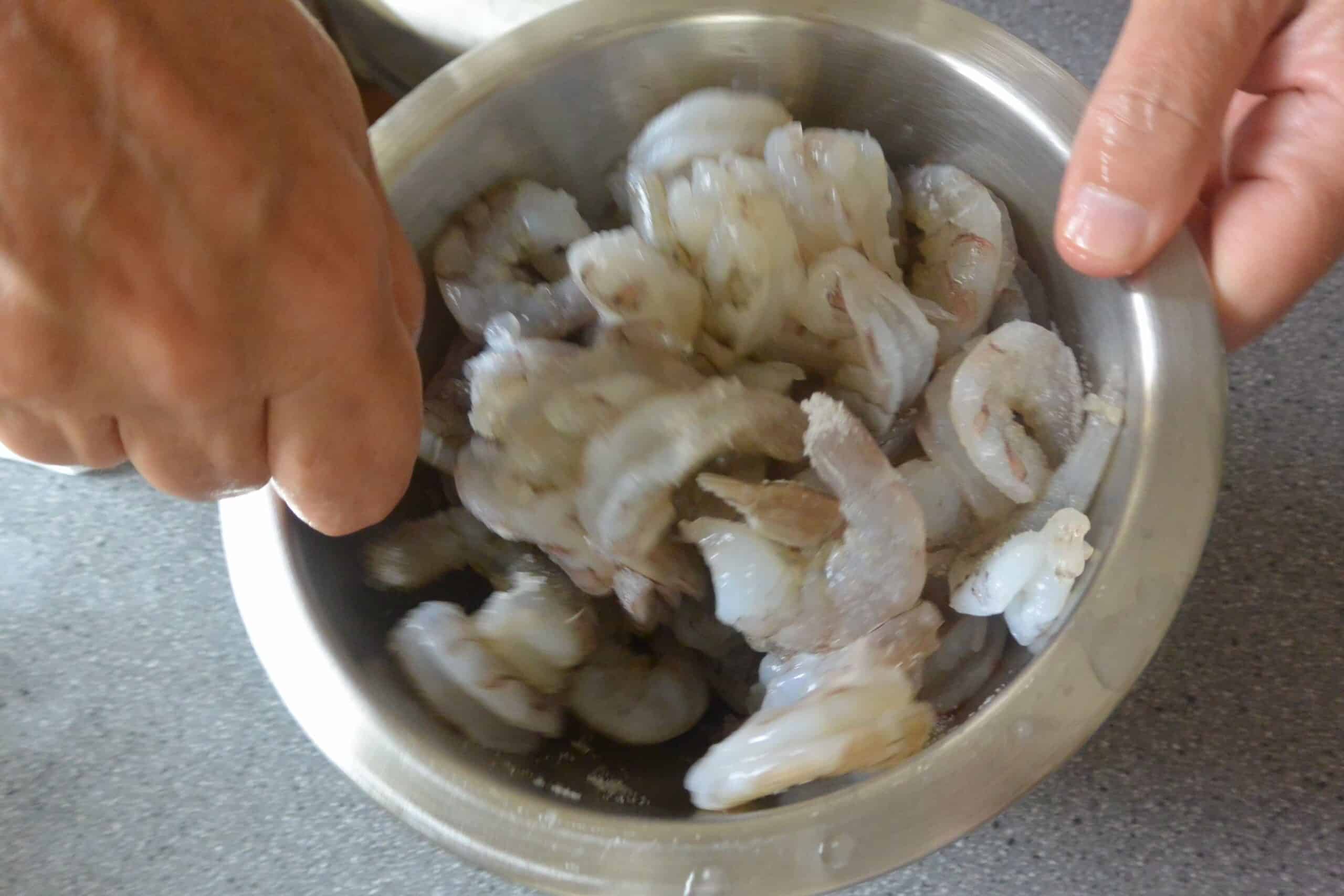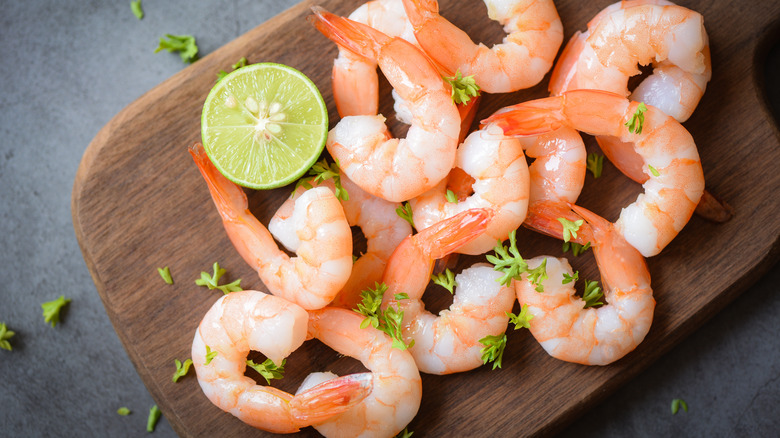Look, we’ve all been there – you’re excited to dig into that shrimp dinner you just prepared, but something seems off That overpowering fishy taste hits your tongue and you’re wondering if you should even keep eating. Don’t worry! As someone who’s cooked thousands of shrimp dishes, I’m gonna break down exactly why this happens and how to fix it
The Quick Answer
If your shrimp tastes too fishy, it’s usually because
- It’s starting to spoil
- It wasn’t properly cleaned
- It’s not fresh enough
- It wasn’t stored correctly
How to Tell if Your Shrimp Has Gone Bad
The Smell Test
Trust your nose! Fresh shrimp should have a light ocean-like smell – kinda like saltwater. If you get hit with an intense ammonia-like or really fishy odor that’s your first red flag that something ain’t right.
Visual Inspection
Here’s what to look for:
- Color: Should be translucent and grayish-green when raw
- Texture: Firm and slightly shiny
- Shell: Should be attached firmly
- Black spots: Could indicate quality deterioration
Why Shrimp Gets That Fishy Taste
1. Age and Freshness
Ya know how things get funky when they sit too long? Same deal with shrimp. As time passes after harvesting, certain compounds build up that create that strong fishy taste. Fresh shrimp = less fishy taste.
2. Storage Problems
I’ve learned this one the hard way! Poor storage is like giving bacteria an all-access pass to party on your shrimp. Here’s what happens:
- Warm temperatures speed up bacterial growth
- Improper freezing can cause texture changes
- Cross-contamination from other seafood
3. Processing and Handling
The way shrimp is handled from ocean to plate makes a huge difference:
- Delayed cleaning after catching
- Poor ice maintenance during transport
- Improper thawing methods
How to Prevent Fishy-Tasting Shrimp
Buying Tips
Listen up! Here’s what I always do when buying shrimp:
- Buy from reliable sources
- Check the harvest/packaging date
- Look for shrimp that’s still frozen solid
- Ask when it was delivered to the store
Storage Solutions
Keep these bad boys fresh with proper storage:
- Store at 40°F or below
- Use within 2 days if fresh
- Keep frozen shrimp at 0°F
- Use airtight containers or freezer bags
Proper Cleaning Techniques
Here’s my foolproof cleaning method:
- Remove the shell (unless recipe says otherwise)
- Take out that dark vein (it’s actually the digestive tract – yuck!)
- Rinse thoroughly under cold water
- Pat dry with paper towels
Fixing Already Fishy Shrimp
Sometimes you’ve already got fishy shrimp on your hands. Don’t panic! Try these tricks:
Acid Treatment
- Soak in lemon juice for 10-15 minutes
- Use vinegar solution (1 tbsp per cup of water)
- Try milk bath method (30 minutes max)
Seasoning Strategies
Cover up mild fishiness with:
- Garlic and butter
- Cajun seasoning
- Coconut milk-based sauces
- Spicy marinades
When to Just Say No
Look, I gotta be straight with you – sometimes shrimp is just too far gone. Toss it if:
- The smell is overwhelmingly bad
- There’s obvious discoloration
- The texture is mushy
- You see mold or slime
Prevention Tips for Future Purchases
Best Buying Practices
- Buy from stores with high turnover
- Check for certification labels
- Ask about sourcing
- Consider frozen over “fresh” if you’re not sure about the source
Seasonal Considerations
Different seasons affect shrimp quality:
- Spring/Summer: Peak fresh shrimp season
- Winter: Frozen might be better
- Local variations apply
The Bottom Line
Getting stuck with fishy-tasting shrimp is no fun, but now you’re armed with the knowledge to prevent it! Remember:
- Buy smart
- Store right
- Clean properly
- Trust your senses
And hey, if you’re ever in doubt, it’s better to be safe than sorry. Nobody wants to deal with food poisoning from bad shrimp – trust me, I’ve been there and it ain’t pretty!
Quick Reference Table: Shrimp Freshness Indicators
| Good Signs | Bad Signs |
|---|---|
| Light ocean smell | Strong fishy odor |
| Firm texture | Mushy feel |
| Clear meat | Discoloration |
| Intact shells | Loose/missing shells |
| Slight sheen | Slimy coating |
Remember, cooking should be fun, not stressful! With these tips, you’ll be serving up perfect, non-fishy shrimp dishes in no time. Now, who’s ready to fire up that grill?
Would you like me to break down any of these points further? I’ve got tons more specific tips and tricks up my sleeve if you need them!

More options for soaking your shrimp

Milk works wonders for neutralizing your fishy-smelling shrimp, but there are other liquids that can mask the odor or taste as well. Marinating shrimp in lime juice is another way to remove the fishiness. Soak the shrimp (in the shell or out of the shell) in a bowl of cold water and lime juice or lime wedges for 15 to 30 minutes. Citric acids work wonders for neutralizing the fishy odor and taste in seafood. Other citric acid odor neutralizers for your shrimp include lemon, vinegar, and tomato.
In Japanese cooking, cooking sake – an alcoholic drink made from fermented rice — is sometimes used to neutralize bad smells in seafood and to give fish and meat an umami flavor boost. Since sake is alcohol and sometimes has a strong flavor, avoid soaking the shrimp for too long or in too much. Try adding just a few splashes to your shrimp and letting them sit for 30 minutes. Or, let the shrimp sit in a marinade for a couple of hours consisting of sake and other ingredients like soy sauce, lemon juice, ginger, garlic, and oil.
Besides soaking your shrimp in milk, citric acids, or a sake marinade, you can also try bathing the shrimp in a bowl of cold salty water and rinsing it with plain water before cooking. Or, sprinkle some salt on the shrimp, stir well, and rinse with cold water, repeating the process a couple of times until the odor is removed.
The Secret to Perfect Shrimp! Fresh, Flavorful & No Fishy Taste
FAQ
Is it okay to eat fishy shrimp?
Safety First: If in doubt, it’s best to err on the side of caution. Consuming spoiled seafood can lead to foodborne illness. In summary, if the shrimp smells fishy, it’s advisable to discard it to avoid any potential health risks.
Why does my shrimp taste like the sea?
Extremely fishy-smelling or tasting shrimp likely means it’s gone bad, but unless you’re eating freshly caught or flash frozen shrimp that hasn’t been thawed …Jul 5, 2024
